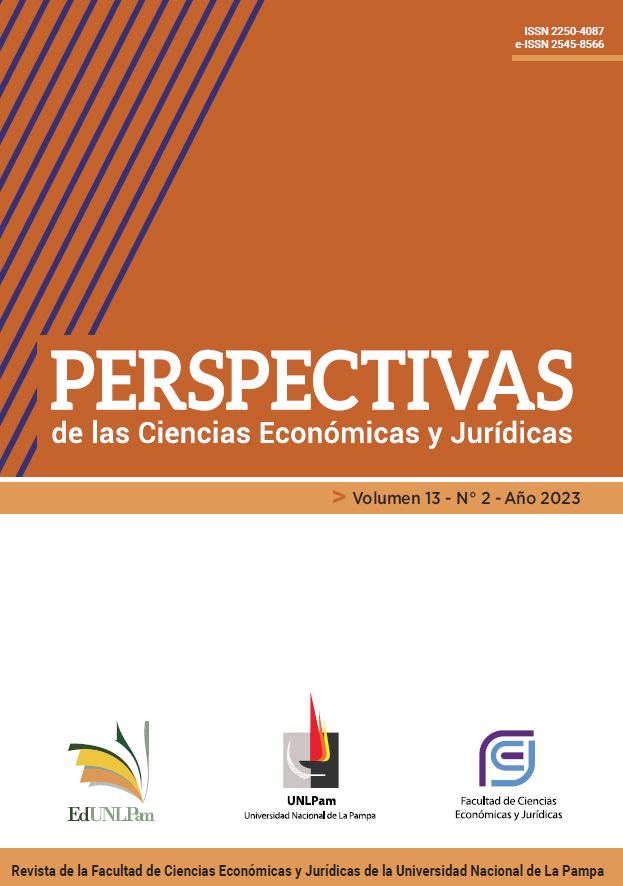El Foro Económico Mundial y la productividad
O Fórum Económico Mundial e a Produtividade. Fundamentos históricos da competitividade
DOI:
https://doi.org/10.19137/perspectivas-2023-v13n2a11Palavras-chave:
Fórum Económico Mundial; Produtividade; Gestão; Competitividade; Competitividade.Resumo
Esta investigação, em primeiro lugar, pretende trazer à luz o papel preponderante desempenhado pelo Fórum Económico Mundial, no final dos anos 70, na disseminação global do conceito de “competitividade”. Simultaneamente, mostra que, desde o início, para o Fórum Económico Mundial, a premissa da “produtividade” vai lançar as bases de um pensamento reflexivo, gestionário e económico, que se centrará na vantagem dos concorrentes. Por outras palavras, trata-se de pensar as ideias históricas e quantitativas de produtividade e de “crescimento das empresas” como o ponto de partida da competitividade. Consequentemente, em segundo lugar, será explicado que, sobretudo a partir dos anos 80, a tónica colocada no crescimento se tornará mais complexa no domínio da gestão estratégica em termos de “reforço da competitividade”. O próprio reforço da competitividade incluirá dimensões qualitativas e uma visão estratégica integral para pensar ofensiva e defensivamente não só a gestão das empresas, mas também, consequentemente, a economia dos países. Assim, esta investigação problematiza sociologicamente a noção contemporânea de “competitividade” e fá-lo destacando os actores, os discursos e as reconfigurações centrais do conceito no seu desenvolvimento histórico.
Downloads
Referências
Anca, H. D. (2012). Litterature review of the evolution of competitiveness. Annals of Faculty of Economics, 1(1), 41-46.
Bongers, A. y Torres, J. L. (2020). Factores determinantes del crecimiento económico: una comparativa a nivel mundial. Papeles de Economía Española, (164), pp. 15-40.
Clarke, J. y Newman, J. (1997). The Mangerial State. Sage Publications.
Davies, W. (2014). The Limits of Neoliberalism. Authority, Sovereignty and the Logic of Competition. SAGE Publications Ltd.
Fougner, T. (2006). The state, international competitiveness and neoliberal globalisation: is there a future beyond “the competition state”? Review of International Studies, 32, pp. 165-185.
Kantola, A. y Seeck, H. (2011). Dissemination of management into politics: Michael Porter and the political uses of management consulting. Management Learning, 42(1), pp. 25-47.
Kiechel III, W. (2010). The Lords of Strategy: the secret of intelectually history of the new corporate world. Harvard Business.
Mas, F. F. (2020). La competitividad como valor social. La gestión pública de turismo en la Argentina del siglo XXI. En D. Navarro-Drazich, Planificación turística I: Formulación. Reflexiones desde el oeste argentino (pp. 57-73). Universidad del Aconcagua.
----------. (2022). El principio reflexivo de la razón de empresa contemporánea: la competitividad. Economía y Sociedad, 27(62), pp. 1-17.
Porter, M. (1985). Competitive advantage: creating and sustaining superior performance. Free Press.
-----------. (1990). The competitive advantage of nations. Harvard Business Review, 68(2), pp. 71-91.
-----------. (1998 [1980]). Competitive Strategy: Techniques for Analyzing Industries and Competitors. Free Press.
-----------. (2017 [1998]). Ser competitivo: Edición actualizada y aumentada. Título original en inglés: On competition. Grupo Planeta.
Porter, M. y Schwab, K. (2008). The Global Competitiveness Report 2008-2009. World Economic Forum - SRO-Kundig.
World Economic Forum [WEF]. (2016). ¿Qué es la competitividad? weforum.org/es/agenda/2016/10/que–es–la–competitividad/
Downloads
Publicado
Edição
Seção
Licença
Aquellos autores/as que tengan publicaciones con esta revista, aceptan los términos siguientes:- Los autores/as conservarán sus derechos de autor y garantizarán a la revista el derecho de primera publicación de su obra, el cuál estará simultáneamente sujeto a la Licencia de reconocimiento de Creative Commons que permite a terceros compartir la obra siempre que se indique su autor y su primera publicación esta revista.
- Los autores/as podrán adoptar otros acuerdos de licencia no exclusiva de distribución de la versión de la obra publicada (p. ej.: depositarla en un archivo telemático institucional o publicarla en un volumen monográfico) siempre que se indique la publicación inicial en esta revista.
- Se permite y recomienda a los autores/as difundir su obra a través de Internet (p. ej.: en archivos telemáticos institucionales o en su página web) antes y durante el proceso de envío, lo cual puede producir intercambios interesantes y aumentar las citas de la obra publicada. (Véase El efecto del acceso abierto).











.png)



5.jpg)












